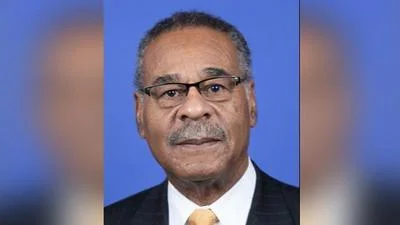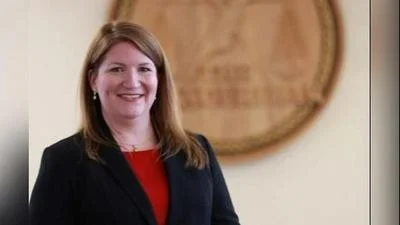Emanuel Cleaver | Emanuel Cleaver Official Website
Emanuel Cleaver | Emanuel Cleaver Official Website
(Washington, D.C.) – On April 25, 2023, U.S. Representatives Emanuel Cleaver, II (D-MO), Sheila Jackson Lee (D-TX), and Shontel Brown (D-OH) introduced the Prison Libraries Act to expand library resources in U.S. state and territory correctional facilities to advance reintegration efforts, reduce recidivism, and increase educational opportunities for incarcerated citizens. This bill will authorize $60,000,000 over six years for state prisons to build capacity amongst their populations by providing library services and resources. The bill is currently supported by 25 co-sponsors and endorsed by 17 organizations from across the country.
"Libraries play an essential role in our communities. By providing books, informational and research materials, and specialized programming, libraries embody opportunity and access for all. This is why it is so critically important that everything libraries offer is made available within correctional facilities for incarcerated individuals," said Congressman Cleaver. "It is no secret that reintegration into communities, heightened by the lack of education or job training opportunities, is one of the biggest barriers incarcerated citizens face upon release. The Prison Libraries Act addresses a facet of this issue by providing funding opportunities to increase library access and resources within state prisons."
“I am pleased to join my colleagues, Representative Emanuel Cleaver and Representative Shontel Brown, on the introduction of this important piece of legislation, the Prison Libraries Act. Every jail and prison should invest in having robust libraries and educational resources. It has long been proven that providing education in jails and prisons improves rehabilitative outcomes, reduces recidivism rates, and ultimately improves public safety and reduces incarceration costs. We must all acknowledge and accept that education is a fundamental human right to which we are all entitled to, and it is one that should be protected and uplifted in every community and in every environment. According to the United Nations Standard Minimum Rules for the Treatment of Prisoners, also called the Nelson Mandela Rules, ‘every prison shall have a library for the use of all categories of prisoners, adequately stocked with both recreational and instructional books, and prisoners shall be encouraged to make full use of it.’ It is time we heed the wise and noble words of guidance and instruction; it is time we rethink and restore humanity for everyone within our community. Those returning from jail or prison should be better, not worse off when coming home,” said Rep. Jackson Lee.
“Everyone deserves access to the invaluable resources provided by our nation’s libraries,” said Rep. Brown. “The Prison Libraries Act works to ensure that incarcerated community members have access to learning and development opportunities available to communities across the country. Expanding access to these resources is important for full, successful reintegration and a key to reducing recidivism and enhancing educational opportunities for incarcerated individuals.”
“By providing the freedom to learn and explore life beyond the confines of prison walls, the Prison Libraries Act gets to the heart of libraries’ mission: equitable access to information for everyone,” said Lessa Kanani’opua Pelayo-Lozado, American Library Association President. “Like libraries in every context, prison libraries make a world of difference through the critical services they offer beyond books. Funding provided by the Prison Libraries Act would expand educational services and improve prospects for those incarcerated members of our communities, who are often afforded the least opportunity – and perhaps the greatest need – in society.”
“Free access to ideas, information, and literature not only enlivens intellects and perspectives amid confining environments, but prepares individuals that are currently incarcerated for eventual re-entry,” said Nadine Farid Johnson, Managing Director of PEN America Washington and Free Expression Programs. “We applaud Representative Cleaver’s bill, which would spur a long-overdue revival of libraries in our nation’s carceral system.”
"I once spent three years in prison without being able to walk into a library. I worked 40 hours a month for 23 cents an hour just to have a new book,” said Reginald Dwayne Betts, Founder & CEO of Freedom Reads. “I know what libraries give and know they are central to the joy and hope and possibilities held within a book. This bill is a reminder of how central that is to our world."
Within the prison community, libraries offer escapism and a means for personal development through learning and acquiring new trades and skills that can be applied upon release. Ultimately, prison libraries are an innovative tool for rehabilitation and re-entry.
Over 600,000 individuals are released from federal and state prisons each year. Upon release, these individuals often struggle to reintegrate into their communities. This struggle is exacerbated by prisons often offering incarcerated individuals little to no educational or job training opportunities. The lack of such resourceful opportunities affects formerly incarcerated individuals' ability to find gainful employment once released and increases the likelihood of recidivism. Libraries are one of the most powerful and transformative resources against recidivism, but they tend to be substantially underutilized, scarce, insufficiently funded, and inadequately equipped with learning, training, information, and communication materials and technologies in American jails and prisons.
The Prison Libraries Act would authorize a competitive grant program for state and U.S. territory prisons to:
Offer adequate library services, including education and job training, digital literacy, career readiness programming, and computer and internet access, among other services, for free;
Invest in acquiring updated materials and equipment that reflect the prison population's interests, identities, abilities, and languages;
Expand the infrastructure of prison libraries;
Hire well-trained and qualified staff to manage libraries, their resources, and services; and
Build a collaborative relationship with respective local public libraries.
The Prison Libraries Act is endorsed by the American Library Association (ALA), NAACP, Vera Institute of Justice, PEN America, Freedom Reads, Citizens United for Rehabilitation of Errants (CURE), Missouri Prison Books, Missouri Humanities, Wisconsin Books to Prisoners, Books to Prisoners Seattle, Prison Library Project at Claremont Forum, Books Through Bars Philadelphia, Prison Book Program, Prisoners Literature Project, D.C. Books to Prisons, Sacramento Public Library, and Friends & Foundation of the San Francisco Public Library.
Official text of the Prison Libraries Act is available here.
Emanuel Cleaver, II is the U.S. Representative for Missouri's Fifth Congressional District, which includes Kansas City, Independence, Lee's Summit, Raytown, Grandview, Sugar Creek, Greenwood, Blue Springs, North Kansas City, Gladstone, and Claycomo. He is a member of the exclusive House Financial Services Committee and Ranking Member of the House Subcommittee on Housing and Insurance.
Original source can be found here.





 Alerts Sign-up
Alerts Sign-up